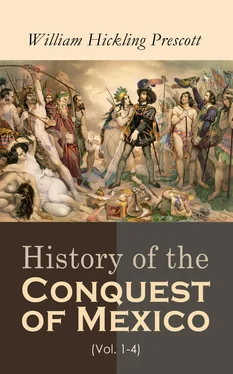The governor of Cuba, however, although irascible and suspicious in his nature, does not seem to have been vindictive, nor particularly cruel. In the present instance, indeed, it may well be doubted whether the blame would not be more reasonably charged on the unfounded expectations of his followers than on himself.
Cortés did not long remain in durance. He contrived to throw back one of the bolts of his fetters, and, after extricating his limbs, succeeded in forcing open a window with the irons so as to admit of his escape. He was lodged on the second floor of the building, and was able to let himself down to the pavement without injury, and unobserved. He then made the best of his way to a neighboring church, where he claimed the privilege of sanctuary.
Velasquez, though incensed at his escape, was afraid to violate the sanctity of the place by employing force. But he stationed a guard in the neighborhood, with orders to seize the fugitive if he should forget himself so far as to leave the sanctuary. In a few days this happened. As Cortés was carelessly standing without the walls in front of the building, an alguacil suddenly sprang on him from behind and pinioned his arms, while others rushed in and secured him. This man, whose name was Juan Escudero, was afterwards hung by Cortés for some offence in New Spain. [500]
The unlucky prisoner was again put in irons, and carried on board a vessel to sail the next morning for Hispaniola, there to undergo his trial. Fortune favored him once more. He succeeded, after much difficulty and no little pain, in passing his feet through the rings which shackled them. He then came cautiously on deck, and, covered by the darkness of the night, stole quietly down the side of the ship into a boat that lay floating below. He pushed off from the vessel with as little noise as possible. As he drew near the shore, the stream became rapid and turbulent. He hesitated to trust his boat to it, and, as he was an excellent swimmer, prepared to breast it himself, and boldly plunged into the water. The current was strong, but the arm of a man struggling for life was stronger; and, after buffeting the waves till he was nearly exhausted, he succeeded in gaining a landing; when he sought refuge in the same sanctuary which had protected him before. The facility with which Cortés a second time effected his escape may lead one to doubt the fidelity of his guards; who perhaps looked on him as the victim of persecution, and felt the influence of those popular manners which seem to have gained him friends in every society into which he was thrown. [501]
For some reason not explained,—perhaps from policy,—he now relinquished his objections to the marriage with Catalina Xuarez. He thus secured the good offices of her family. Soon afterwards the governor himself relented, and became reconciled to his unfortunate enemy. A strange story is told in connection with this event. It is said his proud spirit refused to accept the proffers of reconciliation made him by Velasquez; and that one evening, leaving the sanctuary, he presented himself unexpectedly before the latter in his own quarters, when on a military excursion at some distance from the capital. The governor, startled by the sudden apparition of his enemy completely armed before him, with some dismay inquired the meaning of it. Cortés answered by insisting on a full explanation of his previous conduct. After some hot discussion the interview terminated amicably; the parties embraced, and, when a messenger arrived to announce the escape of Cortés, he found him in the apartments of his Excellency, where, having retired to rest, both were actually sleeping in the same bed! The anecdote is repeated without distrust by more than one biographer of Cortés. [502]It is not very probable, however, that a haughty, irascible man like Velasquez should have given such uncommon proofs of condescension and familiarity to one, so far beneath him in station, with whom he had been so recently in deadly feud; nor, on the other hand, that Cortés should have had the silly temerity to brave the lion in his den, where a single nod would have sent him to the gibbet,—and that, too, with as little compunction or fear of consequences as would have attended the execution of an Indian slave. [503]
The reconciliation with the governor, however brought about, was permanent. Cortés, though not re-established in the office of secretary, received a liberal repartimiento of Indians, and an ample territory in the neighborhood of St. Jago, of which he was soon after made alcalde . He now lived almost wholly on his estate, devoting himself to agriculture with more zeal than formerly. He stocked his plantation with different kinds of cattle, some of which were first introduced by him into Cuba. [504]He wrought, also, the gold-mines which fell to his share, and which in this island promised better returns than those in Hispaniola. By this course of industry he found himself, in a few years, master of some two or three thousand castellanos , a large sum for one in his situation. “God, who alone knows at what cost of Indian lives it was obtained,” exclaims Las Casas, “will take account of it!” [505]His days glided smoothly away in these tranquil pursuits, and in the society of his beautiful wife, who, however ineligible as a connection, from the inferiority of her condition, appears to have fulfilled all the relations of a faithful and affectionate partner. Indeed, he was often heard to say at this time, as the good bishop above quoted remarks, “that he lived as happily with her as if she had been the daughter of a duchess.” Fortune gave him the means in after-life of verifying the truth of his assertion. [506]
Such was the state of things, when Alvarado returned with the tidings of Grijalva’s discoveries and the rich fruits of his traffic with the natives. The news spread like wildfire throughout the island; for all saw in it the promise of more important results than any hitherto obtained. The governor, as already noticed, resolved to follow up the track of discovery with a more considerable armament; and he looked around for a proper person to share the expense of it and to take the command.
Several hidalgos presented themselves, whom, from want of proper qualifications, or from his distrust of their assuming an independence of their employer, he, one after another, rejected. There were two persons in St. Jago in whom he placed great confidence,—Amador de Lares, the contador , or royal treasurer, [507]and his own secretary, Andres de Duero. Cortés was also in close intimacy with both these persons; and he availed himself of it to prevail on them to recommend him as a suitable person to be intrusted with the expedition. It is said he reinforced the proposal by promising a liberal share of the proceeds of it. However this may be, the parties urged his selection by the governor with all the eloquence of which they were capable. That officer had had ample experience of the capacity and courage of the candidate. He knew, too, that he had acquired a fortune which would enable him to co-operate materially in fitting out the armament. His popularity in the island would speedily attract followers to his standard. [508]All past animosities had long since been buried in oblivion, and the confidence he was now to repose in him would insure his fidelity and gratitude. He lent a willing ear, therefore, to the recommendation of his counsellors, and, sending for Cortés, announced his purpose of making him Captain-General of the Armada. [509]
Cortés had now attained the object of his wishes,—the object for which his soul had panted ever since he had set foot in the New World. He was no longer to be condemned to a life of mercenary drudgery, nor to be cooped up within the precincts of a petty island; but he was to be placed on a new and independent theatre of action, and a boundless prospective was opened to his view, which might satisfy not merely the wildest cravings of avarice, but, to a bold, aspiring spirit like his, the far more importunate cravings of ambition. He fully appreciated the importance of the late discoveries, and read in them the existence of the great empire in the far West, dark hints of which had floated, from time to time, to the Islands, and of which more certain glimpses had been caught by those who had reached the continent. This was the country intimated to the “Great Admiral” in his visit to Honduras in 1502, and which he might have reached had he held on a northern course, instead of striking to the south in quest of an imaginary strait. As it was, “he had but opened the gate,” to use his own bitter expression, “for others to enter.” The time had at length come when they were to enter it; and the young adventurer, whose magic lance was to dissolve the spell which had so long hung over these mysterious regions, now stood ready to assume the enterprise.
Читать дальше












